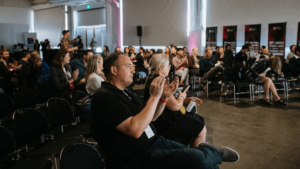If you could sell 20 or 30 tickets at a time, imagine how quickly your event could sell out. Place your marketing focus on groups, and you could boost both attendance and profits.
In this article, we’ll look at selling tickets to companies, organisations and special interest groups. From how to make your approach, to offering group discounts and the tools Eventbrite offers to support you.
Why target group sales?
Attending events is primarily a social exercise – most people prefer not to go alone. As such, it makes sense to promote your event to a collective of people who already spend time together. If an individual within a group expresses interest in an event, it’s likely that others will follow suit.
These people become your ambassadors, selling your event on your behalf and mobilising the group to attend. Target larger groups, and you could end up with coach loads of attendees resulting from minimal marketing spend.
What’s in it for them?
Attending events as a group offers the opportunity for people to socialise in a different setting, whether that’s colleagues getting the chance to relax outside of work or members of an organisation pursuing a common interest.
It can act as a team building exercise or a reward and provides something for everyone to look forward to. Aside from the social benefits that come from attending as a group, they should also be able to enjoy discounts by booking in numbers. You don’t have to offer huge discounts and the reduced revenue is well worth it for the additional sales. You can also offer groups other incentives like exclusive access.
Creating your offer
You can choose to set up offers especially for each organisation you target or create a general group offer. Which you choose will depend on whether you’re focused on achieving high volume sales or if you’re more interested in incentivising attendance from a certain group, regardless of the numbers.
Organisation-specific discount
Setting up a discount code for members of a specific organisation enables them to get money off the ticket price by entering the code at checkout. There’s no minimum number of tickets required per order to obtain the reduction, however it can be applied to any multiple of tickets.
This is a good choice if you want to encourage attendance from an organisation generally, without placing any restrictions on how they must attend i.e. in groups of 10+. You can set up any number of unique discount codes, so each organisation you wish to target can have their own, for example, “WorthingBrownies”. You can tailor the discount offered, the timeframe for obtaining the discount and how many tickets are available. You can also easily monitor how many people have used each code.
General group discount
Eventbrite enables you to apply a discount to an order when a set number of tickets are ordered (feature available to premium users only). For example, if tickets were £10 each, you could offer groups the chance to get them half price when booking a minimum of 10. This would be achieved by creating a new ticket type and setting the price at £5. You then set the minimum number of tickets to support the order (in this case 10).
If you want to restrict a number of people able to get this discount, you can also set a maximum number of tickets per order. The group discount option will be visible to everybody on your event registration page, so although you’ll be able to promote it to specific organisations you won’t be able to make it exclusive to them.
VIP offer
If you really want to make particular organisations feel special, you have the option of creating a hidden offer just for them. First create and hide the ticket type you want to offer. To view the offer they must enter an access code – those without it won’t even know the special ticket type is there!
The ticket type you create could encompass any kind of privilege you like. Ideas include discounted entry, free food or merchandise, queue hop, premium seats, backstage access, an invitation to an after party or a meet and greet. You can still control how many of these tickets are available.
Contacting organisations
Contacting companies – especially big ones – can be daunting. Receptionists are so used to fielding marketing calls, it can be hard to get past the front gate. You need to get your offer to the right person within an organisation who can act as a conduit.
In the first instance, it’s a great idea to mine personal contacts. Think of the companies your friends and family work for or the groups they’re members of and recruit them as promoters. If you have a “warm” referral to the organisation you’re trying to get into that’s half the work done. You can even reward your contacts for their help by creating a referral programme allowing them to earn a percentage of each sale.
Once you’ve exhausted personal relationships, LinkedIn is a good place to go. Lots of large companies have intranets where they distribute company information to employees. Searching for people in the UK with “intranet manager” in their job title will bring up hundreds of people you can target. You can see how you’re related to them through your network i.e. first, second or third contact, and ask for an introduction. Alternatively, now you have their name, you can call up and ask to speak to them.
Do tailor your approach specifically to each organisation. Show an understanding of what they do and why you think they would be interested in your event. Explain the special offer you have created just for them.
Build relationships
Once you make a contact within an organisation, work it. They have the potential to be a great source of repeat custom. Recognise and reward the group leaders who galvanise support for your event by offering them a free ticket as a thank you.
Make sure you provide all the materials they need to promote your event, such as different length write-ups, images and a well designed graphic or printed flyer outlining the special offer created for their organisation.
Conclusion
Attracting groups might mean offering incentives, but it’s not about devaluing your event. You can attract large numbers of your target audience, filling the house with exactly the type of people you want there.
Creating a great atmosphere in turn leads to future sales, ensuring the long-term success of your event. Meanwhile, if you nurture your groups they can become the most stable ticket sales channel to drive revenue.





